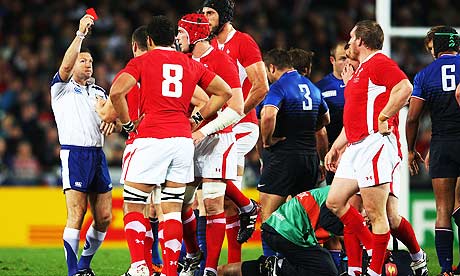
Wales lose 9-8 after having a flanker sent off by an Irish referee before the end of the first quarter for a dangerous tackle and a slow but inexorable decline follows.
Not Auckland in October 2011 but Twickenham in February 1980. Paul Ringer was shown the way to the dressing room – red cards had yet to be introduced in rugby union – for manhandling the England fly-half John Horton and 14 men outplayed their opponents only to succumb to a late kick.
It was Wales's first match of the new decade after a success-drenched 1970s. The golden era turned into a darker colour but the difference now is that they are emerging from the shadows.
Sam Warburton's dismissal after 17 minutes on Saturday for dropping Vincent Clerc to the ground will lead to the referee Alain Rolland becoming as vilified in Wales as the official who dismissed Ringer, David Burnett, but a lesson from 1980 is the need to move on quickly and not to be imprisoned by a sense of injustice.
Just as Burnett left himself with no choice after issuing a final warning following a number of punch-ups, so Rolland was constrained by a directive from the International Rugby Board, first issued in June 2009 and re-emphasised several times since, that when a player lifts an opponent in the tackle and drops him to the ground referees were to start at a red card as a sanction and work backwards.
Rolland, who like Wales and France, was looking for a place in the final, had the choice of displeasing the majority of the 58,629 crowd or his boss. He was never going to say play it again Sam.
Whether Wales would have won had Warburton remained on the field is a question that cannot be answered, but they should have made it to the final 24 years after their only other appearance in the last four had seen them finish with 14 men after the second-row Huw Richards was sent off.
France had a man advantage but never used it. They were content to play for position, kicking the ball out of hand on 43 occasions. They passed it 55 times compared to Wales's 151 and could have been England in disguise. They had to make 139 tackles compared to Wales's 60 and their three-quarters carried the ball for 14 metres between them.
They never looked like scoring a try, apart from a surge in the opening half after Dimitri Yachvili had charged down James Hook's clearance, and they were hanging on at the end as Wales, despite their numerical disadvantage, made it five consecutive matches without conceding a point in the final quarter.
Wales had the chance to regain the lead five minutes from the end but Leigh Halfpenny's penalty from just inside the France half dipped under the crossbar and, while Yachvili kicked three penalties out of three, Wales missed three as well as the conversion of Mike Phillips's try.
If points were awarded for style, Wales would be in the final. But while their acute disappointment manifested itself in the hour after the match with an attack on Rolland, a period of reflection will see them console themselves with the considerable progress they have made in a tournament they have enriched with their smart and savvy rugby.
Wales would have made worthy finalists, even if they would have been without Warburton and the injured prop Adam Jones. They reacted to adversity by refusing to let it sap their morale or resolve; but they missed Warburton's calm authority.
There was a moment in the second-half, after the replacement prop Paul James had collapsed a maul to present Morgan Parra with a penalty that put France 9-3 ahead, when it appeared they would unravel. Gethin Jenkins, who had taken over the captaincy, took exception to something Alun Wyn Jones had or had not done and shoved the second-row as Parra lined up the kick.
Jones was not happy and a verbal exchange followed. It could have been the cue for a collapse, but the former captain Ryan Jones came on as a replacement soon afterwards to apply some balm and within three minutes of his arrival Mike Phillips broke Pascal Papé's tackle to score the only try of the game.
Wales finished with a 27-phase attack that ended when Jamie Roberts knocked on and they were knocked out, but a country that less than a year ago was questioning whether Warren Gatland should be replaced as coach was already anticipating how his side would perform in the 2015 tournament.
"There is an incredible amount of hard work ahead, but other major rugby nations are taking us seriously," Gatland said. "The national squad now has the means to deliver what the Welsh rugby public wants. We have to make schoolboy rugby a priority, but the picture is healthy."
When Wales won the grand slam in 2005 and 2008, they had to build success from the top down and failed. They now find themselves in the same position and they are likely to be only intermittently successful until they establish a firm foundation beneath the national team – one that, in 1980, was crumbling.

